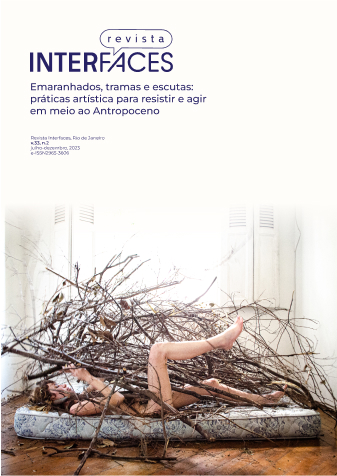O corpo é o chão da experiência: tessituras entre o ritmo mechonniciano e as poéticas do sertão
The body is the ground of experience: weavings between the mechonnician rhythm and the poetics of the sertão
DOI:
https://doi.org/10.60001/ricla.v33.n2.6Resumen
No presente artigo elaboro, concomitantemente a uma dialética da relação, algumas reflexões em deriva que me permitem meditar sobre as complexidades e problemáticas do Antropoceno. São questões que surgem a partir de minha pesquisa de doutorado que consiste no esmiuçar a poética dos cantos de trabalho no sertão norte de Minas Gerais. É a partir dessa ideia central de investigação que encontro as poéticas do chão, lugar em que a linguagem- vegetal do sertanejo permeia a terra ecoliricamente, reproduzindo na dinâmica cotidiana o ritmo do trabalho como ritmo em si. Assim, os cantos configuram o instrumento que fia a relação entre o corpo e o chão. Na geopoética sertaneja, a natureza se mostra para não ser apenas um elemento passivo às ações humanas: ela também é agente e emissora. O chão do sertão é o condutor de um todo em que não há fora, apenas entre. Os cantos de trabalho são a resistência sertaneja que, como refúgio espiritual, se fundem em arte e contrafeitiço decolonial, descentralizando o ente para centralizar a relação: modos de um sertão que artesaneia junto da terra as suas inesgotáveis formas de vida.
Palavras-chave: Antropoceno. Sertão. Minas Gerais. Cantos de trabalho. Ritmo. Meschonnic. Poéticas do chão. Ecocrítica.
Abstract
In this article, I formulate some drifting thoughts alongside a dialetics of relation that allow me to meditate around problems and complexities of the Anthropocene. These are questions that emerge from my doctorate research, focused in scrutinizing the poetics of labour chantings in north sertão of Minas Gerais. Departuring from this core investigation, I find the poetics of the ground, where the vegetable-language of the sertanejo revolves the soil ecolyrically, reproducing in everyday dynamics the rhythm of labour as rhythm itself. By this way, the chantings are an instrument that weaves the relation between body and soil. In sertanejo geopoetics, nature shows itself in order to be not only a passive element to human actions: it is also a doer and a sender. Sertão's ground is the conductor of a whole where there is no outside, only between. Labour chantings are sertanejo resistency as a spiritual refuge, merging art and decolonial counterspell, decentralizing the being in order to centralize the relation: ways of a sertão that crafts with the soil its inexhaustible forms of life.
Keywords: Anthropocene. Sertão. Minas Gerais. Labour chantings. Rhythm. Meschonnic. Poetics of the ground. Ecocritics.
Descargas
Descargas
Publicado
Número
Sección
Licencia

Esta obra está bajo una licencia internacional Creative Commons Atribución 4.0.
O envio dos trabalhos implica a cessão sem ônus dos direitos de publicação, inclusive em versão eletrônica online. Todos os diretos provenientes da venda da revista ficam cedidos à Revista InterFACES. A republicação dos trabalhos deve mencionar a publicação original em Revista InterFACES.

